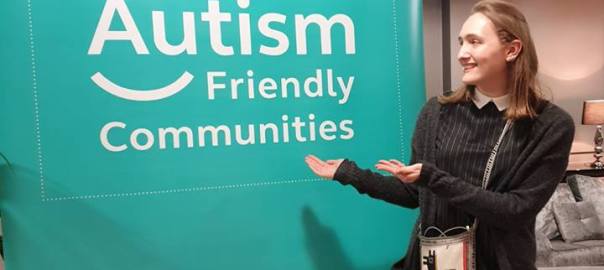please see http://www.neurodiversitymanifesto.com for the original post. thanks.
Neurodivergent Labour: Written submission of evidence to the All-Party Parliamentary Group on Autism’s enquiry into access to justice
Reblogging from http://www.neurodiversitymanifesto.com
Neurodiversity Manifesto: Labour Party Launch
Submitted May, 2019
Neurodivergent
Labour was launched on 9
February 2019 and will have its founding Annual General Meeting later this
year. It continues the work of the Labour
Party Autism / Neurodiversity Manifesto Steering Group, which formed in
2016 with the support of John McDonnell MP for the purpose of drafting a
Manifesto on this issue for the Labour Party.
For more than two years, the Steering Group
consulted widely on the content of the Manifesto and received input from many
autistic (and otherwise neurodivergent) people, from trade unions and other
relevant organisations. We are confident that the resulting Manifesto
represents a set of radical policies with the potential to transform the lives
of autistic people for the better.
You can read the Manifesto
on our website here: https://neurodiversitymanifesto.com/2018/09/18/labour-party-autism-neurodiversity-manifesto-final-draft-version-2018/
This submission is based on those elements of the
Manifesto concerned with access to justice.
The
Current Situation
There…
View original post 338 more words
Neurodivergent Labour: Written submission of evidence to the All-Party Parliamentary Group on Autism’s enquiry into autism and employment
re-blogged from http://www.neurodiversitymanifesto.com
Neurodiversity Manifesto: Labour Party Launch
Submitted to the APPGA, May 2019
Neurodivergent Labour was launched on 9 February 2019 and will have its founding Annual General Meeting later this year. It continues the work of the Labour Party Autism/Neurodiversity Manifesto Steering Group, which formed in 2016 with the support of John McDonnell MP for the purpose of drafting a Manifesto on this issue for the Labour Party.
For more than two years, the Steering Group consulted widely on
the content of the Manifesto and received input from many autistic (and
otherwise neurodivergent) people; from trade unions and from other relevant
organisations. We are confident that the
resulting Manifesto represents a set of radical policies with the potential to
transform the lives of autistic people for the better.
You can read the Manifesto
on our website here: https://neurodiversitymanifesto.com/2018/09/18/labour-party-autism-neurodiversity-manifesto-final-draft-version-2018/
This submission is based on those elements of the Manifesto
concerned with employment.
Many environments and essential…
View original post 376 more words
Positive Policies not Pathologising Patronisation
Neurodiversity Manifesto: Labour Party Launch
A response to the March 2019 Thinking Autism article: ‘What is wrong with The Labour Party’s “Autism Neurodiversity Manifesto” and autism identity politics?’ https://thinkingautism.org.uk/labour-party-neurodiversity-manifesto-identity-politics/
By
Janine Booth on behalf of the Neurodivergent Labour Manifesto group
One of
the most striking things about the Thinking Autism article is something that it
does not include. It contains no disagreement with any of our Manifesto’s
policies. None at all. Instead, it attacks our principles and picks at our
wording. We are more than happy to defend our principles, and do so below, but
let us first remind readers of our Manifesto’s policies.
• Diagnosis/identification and support
Diagnostic/identification service available to all, without delays, which recognises neurodivergent conditions in girls and women as well as in boys and men. Assessment as to whether the individual has other, related conditions.
Adequate support following diagnosis, for example coaching
from other neurodivergent people.
• Independent living, services…
View original post 4,074 more words
Why you need to stop using the puzzle piece to represent autistic people
Acceptance and equality https://autisticalex.files.wordpress.com/2014/04/neurodiversitysymbol.jpg
I hate the puzzle piece. I hate it with every fiber of my being. Therefore, since in a lot of places it’s national autism awareness month, I’m going to write about why you shouldn’t use the puzzle piece.
First; a little history on the puzzle piece. It was originally a national autistic society symbol. It’s history is documented here , towards the end of the piece, but the important bits regarding the puzzle piece are quoted lower down here. (trigger warning for ableism on that piece).
That first logo was this.
![[Image description] A disembodied weeping head on a puzzle piece.](https://dyslexiarules.files.wordpress.com/2019/04/oldnationalautisticsoclogo.jpg?w=300&h=128) [Image description] A disembodied weeping head on a puzzle piece. “’The Committee decided that the symbol of the Society should be the puzzle as this did not look like any other commercial or charitable one as far as they could discover’. It first appeared on our stationary and then on our newsletter in April 1963. Our Society was the…
[Image description] A disembodied weeping head on a puzzle piece. “’The Committee decided that the symbol of the Society should be the puzzle as this did not look like any other commercial or charitable one as far as they could discover’. It first appeared on our stationary and then on our newsletter in April 1963. Our Society was the…
View original post 1,145 more words
LPAND Manifesto Motion passed
Anyone interested in putting the Motion forward to their own Labour Party branch or CLP, please look for the details on the http://www.neurodiversitymanifesto.com website. Congratulations are definitely in order – now for all the other branches and clps… 🙂
Neurodiversity Manifesto: Labour Party Launch
Message from one of our
Neurodivergent Labour Organising Group members, Lucy Stokes:
“Excellent news comrades.
The Autism/Neurodiversity
Manifesto motion for St Thomas’s branch in Dudley North constituency has been
unanimously passed.
Here is the motion:
Labour Party Autism /
Neurodiversity Manifesto
St Thomas’s Branch Labour Party welcomes the
drafting of a specific Labour Manifesto on Autism/Neurodiversity.
We note that this process has been overseen by
a team of neurodivergent Labour Party members and supporters convened by John
McDonnell MP and has had input from trade unions and campaign groups.
We note that autistic, dyslexic, and dyspraxic
people, and people with attention deficit disorders, Tourette’s,
obsessive-compulsive disorders and other neurodivergent conditions experience a
great deal of hostility, distress and disadvantage in our society, and that
strong Labour policies on this issue can make a real difference to people’s
lives.
We support the draft Manifesto’s core
principles of the social model of…
View original post 148 more words
Autistic Children and Young People: How to Help Us
I have spent the past 12 months gathering the views of autistic children and young people: what is important to them, what their biggest challenges are and what they would like to change in their lives.
Before reading this, please watch this music video I have created, sharing the voice of some of these children and young people.
I have created surveys and questionnaire which to date over 900 autistic children have responded to, I have interviewed and spoken directly to around 80 children and have also consulted with hundreds of autistic adults on what they wish life was like for them when they were children.
There are four key themes that were identified during this process, and I would like to share these 4 themes with you.
Please be mindful this is just an overview of the priorities of autistic children and young people. More in-depth information, support and…
View original post 787 more words

The Fallacy of Functioning Labels
Spend enough time in the autism community, and you’ll notice the popularity of the “functioning label.” “I’m a high functioning autistic,” people will proclaim. “My brother has low functioning autism,” people will say. You could also put talks of severity in this category with “My son is only mildly autistic” or when people ask “how do I interact with someone who has severe autism?” You will see this relatively frequently.
However, these labels are not as straightforward as they are sometimes made out to be. These labels are entirely arbitrary and are neither accurate nor useful for describing autistic people, as I will discuss.
“But, Quincy!” I can hear you yelling through your computer, “That can’t be! Obviously there are distinct differences between high functioning and low functioning autism!”
People will observe and see an autistic person who is highly intelligent, seemingly articulate, attends regular school classes, and is even…
View original post 1,162 more words

‘Everything is AUsome’: My First Autism Conference
Aspie & Me: A Self-Portrait of Asperger's
Yesterday, I attended my first ever autism conference and it was easily one of the most heartening, uplifting experiences of my life! Being the inaugural year of the ‘AUsome Conference’ the wonderful Evaleen Whelton has worked tirelessly to ensure this landmark occasion will be remembered for years to come, and I congratulate her most heartily on the incredible success that was the finished product. From the delightfully rich array of guest speakers to the incorruptible sense of optimism, pride and solidarity that impregnated the air from start to finish, I wish I could bottle the entire thing and relive it over and over. I cried a little, laughed a lot and loved it all.
Here, all self-consciousness went out the window.
I could take off my shoes and walk around in my tights if I felt like it without anyone so much as batting an eyelid – in fact, I…
View original post 1,458 more words
The Launch of Neurodivergent Labour: Tickets are Sold Out!
Neurodiversity Manifesto: Labour Party Launch
We (i.e. a handful of Steering Group members who are organising the launch of the new organisation ‘ Neurodivergent Labour‘) are delighted to let you know that the launch of Neurodivergent Labour on 9th February is sold out!
This is an exciting development for all Labour Party members who are neurodivergent.
Following on from the successful development of a Labour Party Autism / Neurodiversity Manifesto, and in response to calls from many Labour members, we are setting up a new society within the Labour Party; Neurodivergent Labour.
All Labour Party members who are Neurodivergent are welcome to attend the launch meeting of Neurodivergent Labour. This new organisation aims to represent Autistic, Dyslexic, Dyspraxic and Dyscalculic people, and people with ADD (with or without Hyperactivity), Tourette’s or other developmental atypical neurological conditions.
We aim for this society to be democratically run by neurodivergent people for neurodivergent people, to make…
View original post 97 more words